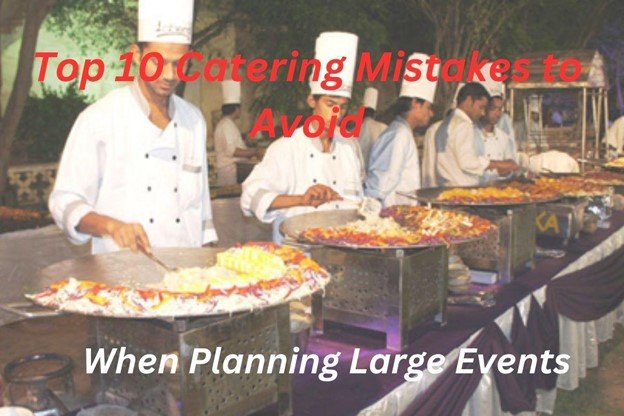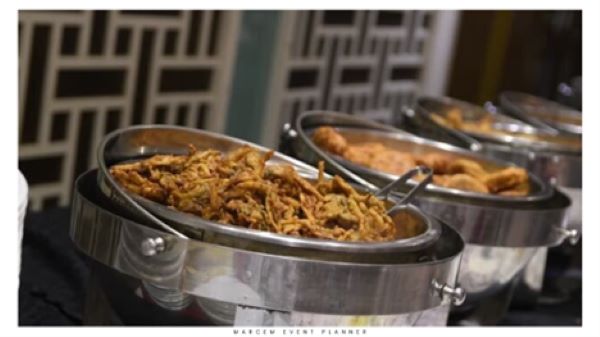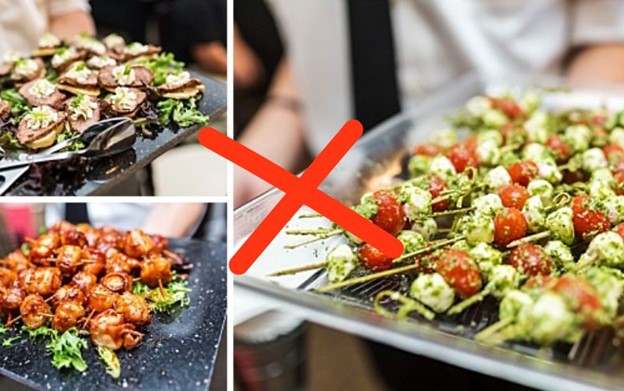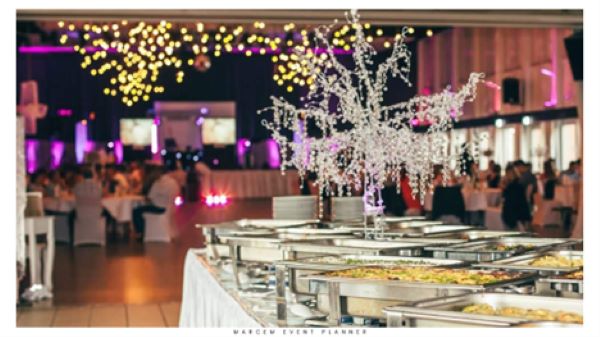Top 10 Catering Mistakes to Avoid
When Planning Large Events
Make Your Event Memorable
and Cherishable!

Catering mistakes often have the power to ruin your event and drain your money. Something which can be easily avoided if you do care to heed to know the simple tips.
Organizing a major event involves numerous challenges and complexities.
Whether it's a corporate function, wedding, or charity gala, the need to impress attendees is tangible because food serves as the primary medium through which guests perceive your event.
Try to achieve perfect catering execution to ensure guests discuss the meal for months without any catering mistakes. Should you make a mistake, people may only recall that error due to unfavorable reasons.
If you're looking to ensure a smooth and professional experience, it's always wise to work with custom catering services that understand the nuances of large-scale event planning.
10 Most Overlooked Catering Mistakes
In this post, we’ll talk about 10 most common catering mistakes people make when planning large events, and show you how to avoid them so your event goes off without a hitch.
1. Underestimating Guest Count
A frequently encountered error involves misjudging the expected number of attendees.
The allure of cost-saving through minimal planning exists, yet both food over-ordering and under-ordering can result in unexpected failures.
Running out of food during your event causes negative perceptions about its success. Conversely, excessive food quantities drive up expenses while simultaneously generating waste.
Tip: Always plan for a 10% buffer. If you're expecting 200 guests, plan for 220. People often bring plus-ones, or last-minute attendees show up. It's better to be safe than scrambling for extra plates.
2. Choosing the Wrong Menu for the Audience

Elements suitable for wedding receptions often fail to meet the requirements of business conferences.
One of the significant catering mistakes is neglecting to customize your menu according to your guests' likes, dietary needs, and event atmosphere.
When designing your menu and serving style for diverse audiences such as children, elderly guests, or time-constrained professionals, ensure your approach meets their specific needs.
A networking lunch may find a fancy five-course meal unsuitable.
Tip: Survey guests in advance, if possible, and offer vegetarian, vegan, gluten-free, and nut-free options. It shows thoughtfulness and avoids awkward moments for those with dietary needs.
3. Ignoring Venue Limitations
Theoretical dream menus may appear spectacular in written form yet transform into logistical disasters when venue capabilities fall short.
Many planners mistakenly commit catering mistakes by choosing menus that require on-site cooking or last-minute prep despite the venue lacking kitchen facilities
Tip: Visit your venue with your caterer before finalizing the menu. Understand what’s possible and what needs to be adapted. Don’t assume that every space is event-ready for food service.
4. Lack of Clear Communication with the Caterer
Even experienced planners sometimes assume the caterer understands what they want, but assumptions can easily lead to catering mistakes.
Miscommunication about timing, staffing, serving style, or portion sizes can cause delays and dissatisfaction.
Tip: Write everything down. Confirm the menu, service schedule, number of servers, bar requirements, and set-up/clean-up details. A solid contract with a clear scope of work helps both sides avoid surprises.
5. Not Scheduling a Tasting

Skipping a tasting is like buying a car without test-driving it. Pictures and menu descriptions don't always translate to taste and presentation. Some dishes sound great but fall flat on flavor or portion size.
Tip: Always schedule a tasting with your caterer. Use it to evaluate not just the food, but also the professionalism, attention to detail, and flexibility of the team.
6. Underestimating Service Style Needs
Buffet, plated, or family-style — your choice impacts flow, timing, and staffing.
One of the common catering mistakes is picking a service style without considering the event format or number of guests.
A buffet might be affordable but cause long lines if not well-managed. A plated dinner adds elegance but requires more servers and time.
Tip: Match your service style to the event's tone and schedule. For larger groups, consider a hybrid model: plated starters with a buffet main to balance efficiency and elegance.
7. Forgetting About Timing
Food and event flow must go hand-in-hand. Service delays can throw off the entire schedule, especially for events with speakers or entertainment.
Similarly, serving too early or too fast can leave guests restless.
Tip: Build in extra time around meals. Work with your caterer to create a detailed timeline and rehearse the timing if possible. It’s all about coordination.
8. Not Accounting for Beverage Logistics
Many individuals concentrate so much on food that they lose sight of drinks, which is an important component of the dining experience.
Whether it be alcoholic beverages, coffee, or soft drinks, inadequate beverage preparation might result in long lines, dissatisfied visitors, or empty glasses mid-event.
Tip: Decide whether your caterer is handling drinks or if you need a separate vendor. Plan for drink stations, bartenders, mixers, and ice. Don’t forget about water, especially for outdoor or summer events.
9. Overcomplicating the Menu

It is tempting to go all out with exotic or gourmet dishes to impress guests, but this can easily overwhelm the kitchen and delay service.
Complicated menus also increase the risk of committing catering mistakes.
Tip: Focus on a few standout dishes done well. Quality over quantity. Familiar foods with a twist tend to be crowd-pleasers, and simpler menus are easier to execute at scale.
10. Not Having a Backup Plan
Things can and do go wrong; weather changes, equipment malfunctions, or last-minute cancellations. Failing to prepare for emergencies can derail your entire catering setup.
Tip: Ask your caterer what backup plans they have in place. Do they bring extra supplies? Can they accommodate last-minute changes? Also, consider having a contingency plan for outdoor events or late vendor arrivals.
Final Thoughts on Eliminating Catering Mistakes
By avoiding the common catering mistakes and pitfalls we’ve discussed, you’ll be well on your way to hosting an event that’s both smooth and memorable.
Whether you're working with a professional or taking the DIY route, staying organized, communicating clearly, and planning is key to catering success.
Your guests may not remember the color of the napkins, but they’ll remember how good the food was — and how seamlessly it was served.
Written By: Ronin Lucas
Creative Event Planner & Marketing Strategist specializing in corporate events, brand experiences, and growth campaigns. Turning visions into impactful events that captivate, connect, and convert audiences.